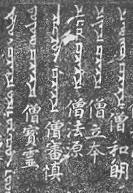Once again there has been
a post on Between Two Worlds on 1 Tim. 2:12 featuring Dr. Kostenberger's interpretation of that verse. It is interesting to me that no less than 15 other blogs have linked to that post. It indicates that there is a strong thirst for a justification for restricting women's roles.
I entered the fray and as usual have found that my knowledge is deepened as I peruse other resources for ways to present this topic to the non-reader of Greek.
Here is where to start. The entries from the BDAG and Louw and Nida lexicons,
“to assume a stance of independent authority, give orders to, dictate to” (BDAG 150). Louw and Nida elaborate further, suggesting that the appropriate rendering for authenteo in 1 Tim 2:12 is “to control, to domineer” or “to control in a domineering manner” (37.21).
Next, one can look at the primary evidence. I have done so. However, to save you time, we can note that Dr. Kostenberger remarks that there are only one or two occurrences of this word early enough to be used as evidence. The one certain citation is listed in the original study by Baldwin under the meaning of "to compel, to influence someone." and Grudem agrees with the translation "compel." (Ev. Fem & Biblical Truth. page 677 - 680.) According to Grudem other translators suggest "prevail" and mention that this is a hostile relationship involving insolence.
The other occurrence of authenteo at the time, in Philodemus, is now agreed upon as reconstructed with meaning unknown. That is why Dr. Kostenberger hesitates to claim two occurrences. Later evidence demonstrates that
authenteo tends to have a negative connotation, more often than not.
Third, Dr. Kostenberger claims that the two verbs in 1 Tim. 2:12 must either both have a negative connotation or both a positive connotation. Most people agree with this. However, where Dr. Kostenberger says that
didaskein "virtually always" has a positive connotation, others note that in Titus 1:11,
didaskein does have a negative connotation. Therefore, it is more likely that
authenteo and
didaskein both have a negative connotation in this verse.
Fourth, Dr. Kostenberger assumes that the meaning of
authentein is somewhat synonymous with having a leadership role in the church. However, previous translations show that this is a recent assumption. The Latin Vulgate has
dominare and Luther's Bible has
herrschen - "to lord it over."
In 1 Peter 5:3 these two words
dominare and
herrschen are found again. For both Jerome and Luther, the word in 1 Tim. 2:12 was not a synonym for pastoring but was a synonym for "domineering" over someone else, as in 1 Peter 5:3,
not domineering over those in your charge, but being examples to the flock. ESV
These are not translations of the same word in Greek. 1 Tim. 2:12 has
authenteo and 1 Peter 5:3 has
katakurieuo. However, we can say that Jerome and Luther thought that these words were synonymous and respectively translated both these words identically with a word meaning "to lord it over."
How did the English translations come to have "have authority" in 1 Tim. 2:12 then? In 1516, Erasmus provided the Greek text of the New Testament in printed form in parallel with his translation into Latin. He translated
authenteo as "authoritatem usurpare." The Latin lexicons list
usurpare as "use, seize, grab, take, have, exercise." From that, some translators derived the meaning "to have authority" and others, such as the KJV, as "to usurp authority."
I suggest that 1 Tim. 2 :12 ought to properly be translated as,
I do not permit a woman to teach or to domineer over a man; rather, she is to be quiet.
I am aware that this does not resolve all the hermeneutical and pragmatic difficulties of the passage. However it does provide us with a starting place.
For further reading, I suggest
Belleville, Linda. Teaching and Usurping Authority: 1 Timothy 2:11-15" (Ch 12) in
Discovering Biblical Equality.And these posts by
Ben Witherington and
Emily Hunter McGowin.





Thanks for a great post on Romans 16 and it certinly gives much pause for thought on women in church based service. Keep in mind that I’m not an egalitarian, but I have a few quibbles with your handling of Rom. 16.7:
1.There are over 200 inscriptions of Junia and in every single one it is feminine and in every single manuscript of Romans (except two) it is feminine as well. This is hardly ambiguous, it is overwhelming.
2. “Outstanding ... apostles” is certainly ambiguous in the Greek, but in most translations Andronicus and Junia are regarded as apostles. Chrysostom has an excellent comment about how great she must have been to have been counted worthy of the designation apostle. See also Linda Belleville’s article on this against Dan Wallace.
3. Apostle here could mean apostle in the sense of a delegate of a church, much like Epaphroditus from Philippi, but usually the name of the sending church is also given or some kind of qualifier (e.g. your apostle). I surmize that A & J were either the founders of the first Jewish Christian ekklesia in Rome, or else they were among the extended witnesses to Jesus’ resurrection.
An excellent read on this verse is the book by Eldon J. Epp.
My comments are motivated by the fact that I cannot believe the violence done to the text by the ESV translators. Junia is no longer a women and no longer an apostle. This is the clearest case of agenda-driven textual tinkering that I’ve ever seen.
What is really nice to know is that when it comes to caring about good scholarship many complementarians and egalitarians are on the same page.